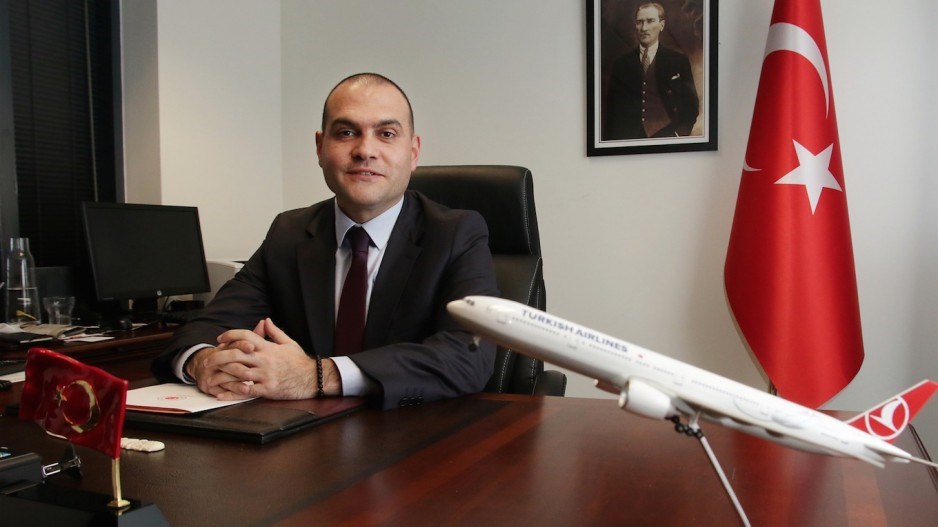Turkish Airlines (IST:THYAO) has announced plans to fly non-stop between Istanbul and Vancouver, but a bureaucratic hurdle may keep the carrier from launching its desired route.
In mid-October, the airline posted a notice to the investor relations part of its website saying that it “has decided to start operating scheduled flights, based on market conditions, to Vancouver, Canada.”
The notice was a heads-up to investors, given that slightly more than half of the venture’s shares trade on the Borsa Istanbul stock exchange. The Turkish government holds the remainder.
The airline did not reveal a launch date for the route because it is not yet a done deal. Canada and Turkey must sign off on changes to a bilateral air-services agreement to enable domestic carriers to fly to three cities in the foreign country, up from two.
The ability to fly to a third city is key because Turkish Airlines already flies non-stop between Istanbul and Toronto, and between Istanbul and Montreal.
Air Canada (TSX:AC) had operated non-stop flights between Toronto and Istanbul but suspended them in 2017 “as a result of a decrease in travel demand,” spokeswoman Angela Mah told Business in Vancouver.
Air Canada, however, could spoil Turkish Airlines’ plans.
National carriers, such as Air Canada, have an almost veto-like power over changes to air-services agreements. In 2010, Air Canada stymied Emirates airline’s effort to get governments to change an air-services agreement to allow it to operate non-stop flights between Dubai and Vancouver. Air Canada CEO Calin Rovinescu explained to BIV in 2013 that his opposition was because he believed Emirates would pick up passengers from Canada and take them to third countries using Dubai as a stopover.
Air Canada also opposed Singapore Airlines’ (SGX:C6L) 2007 request to increase to daily its thrice-weekly flights between Singapore and Vancouver via Seoul, Korea, because Air Canada feared losing passengers.
That opposition prompted Ottawa to reject Singapore Airlines’ request for increased frequency, spurring the airline to stop flying out of Vancouver in April 2009.
Mah declined to say if Air Canada is amenable to Turkish Airlines flying to Vancouver. Instead, she said that the airline would present its views to governments through the bilateral process.
Turkey’s consul general in Vancouver, Taylan Tokmak, played down fears that there would be obstacles.
“My understanding is that right now there is not a problem,” he told BIV. “They have sorted it out, the two companies [Air Canada and Turkish Airlines]; this is what my understanding is.”
He said a “high-level delegation” from Turkish Airlines met with Vancouver Airport Authority officials in October, and that there have been discussions around Turkish Airlines opening an office at Vancouver International Airport.
Airport officials told BIV that they welcome the proposed route because it is their role to connect B.C. to the world.
Tokmak said Canada and Turkey held air-services agreement negotiations before the October 21 federal election and that negotiators are waiting for a new Canadian government to take shape before they sign any new agreement.
“It’s a priority on our agenda,” Tokmak said. “Our embassy in Ottawa is following this. Hopefully we will do [the change to the air-services agreement] right after the new government is formed.”
Travellers and the local economy would stand to benefit if the route goes into service because non-stop flights expand the base of potential visitors and can enhance business opportunities.
Air Canada launched non-stop seasonal flights between Vancouver and Delhi, India, in 2016 and increased frequency to daily flights year-round in early June. Indian visits to Vancouver have spiked 33.8% in the first eight months of 2019 compared with the same period a year ago.
Istanbul Airport opened in 2018 and is undergoing expansion that by 2028 is expected to enable it to handle 200 million passengers annually. Dozens of non-stop routes fly from there to countries such as Iran and Russia and would speed travel time to those destinations from Vancouver.
Advocates for years have been lobbying for non-stop flights between Istanbul and Vancouver.
BIV reported in 2016 that the Vancouver Turkish Canadian Society (VTCA) launched a petition on Change.org, calling for an airline to launch the route. The petition closed with 1,549 supporters.
Tolga Tosun, who was then president of the VTCA, told BIV last week that he launched the Turkic World Spring Festival in 2017 to bring together people from “the Turkish world,” or those who speak Turkish or were historically part of the Ottoman Empire.
He believes that non-stop flights would be packed with people and that business and cultural exchanges would flourish.
B.C. exported $151.4 million worth of goods to Turkey in 2018, according to BC Stats. About 81% of that was $123.3 million in coal and solid fuels manufactured from coal.
Canada was the source of approximately 0.4% of imports into Turkey in 2018. Approximately 1.1% of exports from Turkey were destined for Canada in that year, according to BC Stats.




